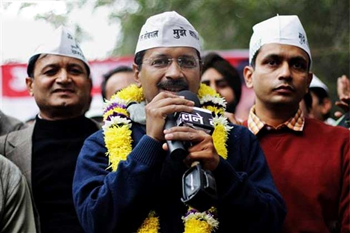 New Delhi, Jan 31: The dust is still to settle on the faceoff between the UPA and the Aam Aadmi Party's government in Delhi over who should control the Delhi police, but the Union government is already wary of another impending confrontation with Arvind Kejriwal and his supporters, this time over the Jan Lokpal Bill.
New Delhi, Jan 31: The dust is still to settle on the faceoff between the UPA and the Aam Aadmi Party's government in Delhi over who should control the Delhi police, but the Union government is already wary of another impending confrontation with Arvind Kejriwal and his supporters, this time over the Jan Lokpal Bill.
The Aam Aadmi Party has stated its intention of passing the bill at a public session of the Assembly to be held at Ramlila Maidan, the venue of Anna Hazare's historic agitation.
Kejriwal said they were all set to introduce the Jan Lokpal bill in Delhi assembly in a press conference on Thursday. "It will be introduced in the cabinet on Friday and in 10-15 days there might be an assembly session where it will be passed," he said.
While the Delhi Cabinet is still debating some provisions and the final draft is expected today, reports say the bill seeks life imprisonment as maximum punishment for corruption and a minimum punishment of six months.
It also proposes that the Lokayukta will have the powers to confiscate property and assets of the accused official. Given the nature of the promises made by party leaders, Central government leaders believe the Delhi Lokayukta could very well be draconian.
On Wednesday, The media reported that officials are concerned about whether the Delhi bill will be in consonance with the Union government's Act, which was notified on 1 January.
"If it is at variance, the Delhi government could be asked to modify or amend certain provisions," a senior MHA official is quoted as having said.
Given that the Delhi bill will require the assent of the President, and given that Kejriwal and Manish Sisodia have both committed to passing the Delhi bill at a special session of Assembly in February, a delay by the Centre in comparing the Delhi bill with the Central Act could snowball into another confrontation.
Additionally, with the UPA itself hoping to make a strong political move by passing six anti-corruption bills in Parliament subsequently, there is no doubt that the Centre will be reading the fine print of the Delhi bill carefully. Presidential assent for the Delhi bill could be expected in a week's time, if it is in complete consonance with the Lokpal Act passed by Parliament, an official said.
The Delhi Bill is believed to be mostly on the lines of the Uttarakhand Lokayukta Act, with some additional provisions.
Reports said Kejriwal was keen that the office of the CM come under the ambit of the Lokayukta, as well as all MLAs and other government officials.
Kejriwal's Cabinet could clear the final draft on Friday.





Comments
Add new comment